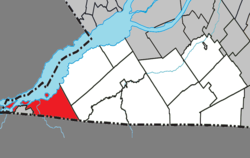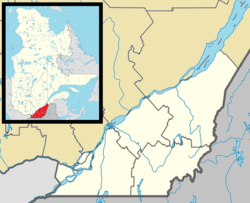Dundee, Quebec
Dundee | |
|---|---|
 Dundee town hall | |
 Location within Le Haut-Saint-Laurent RCM | |
| Coordinates: 45°00′N 074°30′W / 45.000°N 74.500°W[1] | |
| Country | Canada |
| Province | Quebec |
| Region | Montérégie |
| RCM | Le Haut-Saint-Laurent |
| Constituted | July 1, 1855 |
| Named for | Dundee[1] |
| Government | |
| • Mayor | Linda Gagnon |
| • Federal riding | Salaberry—Suroît |
| • Prov. riding | Huntingdon |
| Area | |
| • Total | 84.07 km2 (32.46 sq mi) |
| • Land | 68.41 km2 (26.41 sq mi) |
| Population (2021)[4] | |
| • Total | 386 |
| • Density | 5.6/km2 (15/sq mi) |
| • Pop (2016-21) | |
| • Dwellings | 310 |
| Time zone | UTC−5 (EST) |
| • Summer (DST) | UTC−4 (EDT) |
| Postal code(s) | |
| Area code(s) | 450 and 579 |
| Highways | |
| Website | www |
Dundee is a township municipality in Le Haut-Saint-Laurent Regional County Municipality in the Montérégie administrative region of Quebec, Canada. At the 2021 Canadian census, the population was 386. It is primarily an agricultural area consisting of dairy and grain farms.
Geography
[edit]Dundee is located in the southwestern corner of the Montérégie region of Quebec. The township is bordered on the south by the Canada–United States border, on the north-west by the Saint Lawrence River, and the Mohawk reserve of Akwesasne to the west. The Salmon River runs through the municipality in a northwesterly direction from the US border to the Saint Lawrence, where many islands also make up Dundee's total area.
Communities
[edit]In addition to the namesake community along the Salmon River at the United States border, the following locations reside within the municipality's boundaries:[1]
- Dundee Centre (45°01′44″N 74°25′37″W / 45.02889°N 74.42694°W) – a hamlet in the centre of the township
- L'Île-Saint-Régis (45°01′08″N 74°38′09″W / 45.01889°N 74.63583°W) – a hamlet located on an island of the same name in the Saint Lawrence River
- Pointe-Fraser (45°02′46″N 74°27′58″W / 45.04611°N 74.46611°W) – a vacation cottage community on the Saint Lawrence River
- Pointe-Leblanc (45°04′23″N 74°26′18″W / 45.07306°N 74.43833°W) – a vacation cottage community on the Saint Lawrence River
- Sainte-Agnès-de-Dundee (45°00′34″N 74°24′04″W / 45.00944°N 74.40111°W) – a village in the southern area of the township
-
Dundee Centre
-
Ste-Agnes-de-Dundee
Lakes and rivers
[edit]The following waterways pass through or are situated within the municipality's boundaries:[1]
- Rivière aux Saumons (45°02′09″N 74°31′25″W / 45.03583°N 74.52361°W) – runs from the US border to the Saint Lawrence River in the municipality's western area.
History
[edit]John Davidson, considered the founder of the municipality, was an early settler along the Salmon River (Rivière aux Saumons). He was originally from Dundee, Scotland, and served as postmaster of the new settlement.[1]
On July 1, 1845, the Municipality of Dundee was formed, but merged into the Municipality of Beauharnois Number Two on September 1, 1847 (along with Hinchinbrooke, Hemmingford, Godmanchester, St. Anicet, Russeltown, and Ormstown). It was reestablished on July 1, 1855. On March 15, 1969, it changed statutes and became a township municipality.[5]
Demographics
[edit]In the 2021 Census of Population conducted by Statistics Canada, Dundee had a population of 386 living in 168 of its 310 total private dwellings, a change of -0.3% from its 2016 population of 387. With a land area of 68.41 km2 (26.41 sq mi), it had a population density of 5.6/km2 (14.6/sq mi) in 2021.[4]
| 2021 | 2016 | 2011 | |
|---|---|---|---|
| Population | 386 (-0.3% from 2016) | 387 (-5.1% from 2011) | 408 (-6.4% from 2006) |
| Land area | 68.41 km2 (26.41 sq mi) | 69.45 km2 (26.81 sq mi) | 69.76 km2 (26.93 sq mi) |
| Population density | 5.6/km2 (15/sq mi) | 5.6/km2 (15/sq mi) | 5.8/km2 (15/sq mi) |
| Median age | 52.0 (M: 52.4, F: 50.4) | 52.0 (M: 53.2, F: 49.5) | 47.5 (M: 47.6, F: 47.4) |
| Private dwellings | 310 (total) 168 (occupied) | 359 (total) 169 (occupied) | 336 (total) |
| Median household income | $62,000 | $51,072 | $27,926 |
|
|
| |||||||||||||||||||||||||||||||||||||||||||||||||||||||||||||||
| Source: Statistics Canada[11] | |||||||||||||||||||||||||||||||||||||||||||||||||||||||||||||||||
| Canada Census Mother Tongue Language - Dundee, Quebec[11] | ||||||||||||||||||
|---|---|---|---|---|---|---|---|---|---|---|---|---|---|---|---|---|---|---|
| Census | Total | French
|
English
|
French & English
|
Other
| |||||||||||||
| Year | Responses | Count | Trend | Pop % | Count | Trend | Pop % | Count | Trend | Pop % | Count | Trend | Pop % | |||||
2016
|
390
|
245 | 62.82% | 115 | 29.49% | 10 | 2.56% | 15 | 3.85% | |||||||||
2011
|
410
|
255 | 62.20% | 130 | 31.70% | 10 | 2.44% | 15 | 3.66% | |||||||||
2006
|
430
|
250 | 58.14% | 155 | 36.05% | 0 | 0.00% | 25 | 5.81% | |||||||||
2001
|
415
|
200 | 48.19% | 180 | 43.37% | 10 | 2.41% | 25 | 6.02% | |||||||||
1996
|
400
|
220 | n/a | 55.00% | 135 | n/a | 33.75% | 10 | n/a | 2.50% | 35 | n/a | 8.75% | |||||
Attractions
[edit]Lake Saint-François National Wildlife Area is a National Wildlife Area on the shores of Lake Saint Francis in Dundee. This noncontiguous 1,317 hectares (3,250 acres) site protects a wetland environment with large biodiversity, home to more than 287 animal species and 547 plant species, many of which are at risk. It is also designated as a Ramsar site and an Important Bird Area (IBA).[12]
Notable people
[edit]- Sheila Fraser - Auditor General of Canada from 2001 to 2011
See also
[edit]References
[edit]- ^ a b c d e "Banque de noms de lieux du Québec: Reference number 19755". toponymie.gouv.qc.ca (in French). Commission de toponymie du Québec.
- ^ a b "Répertoire des municipalités: Dundee". www.mamh.gouv.qc.ca (in French). Ministère des Affaires municipales et de l'Habitation. Retrieved 5 October 2023.
- ^ Riding history for Beauharnois—Salaberry, Quebec from the Library of Parliament
- ^ a b c "Dundee, Canton (municipalité de) (CT) Census Profile, 2021 Census of Population". www12.statcan.gc.ca. Government of Canada - Statistics Canada. 9 February 2022. Retrieved 5 October 2023.
- ^ "Répertoire des entités géopolitiques: Dundee (canton) 1.7.1845 - 1.9.1847 * 1.7.1855 - ..." www.mairesduquebec.com. Institut généalogique Drouin. Retrieved 5 October 2023.
- ^ "2021 Community Profiles". 2021 Canadian census. Statistics Canada. February 4, 2022. Retrieved 2023-10-19.
- ^ "2016 Community Profiles". 2016 Canadian census. Statistics Canada. August 12, 2021. Retrieved 2023-10-05.
- ^ "2011 Community Profiles". 2011 Canadian census. Statistics Canada. March 21, 2019. Retrieved 2014-01-27.
- ^ "2006 Community Profiles". 2006 Canadian census. Statistics Canada. August 20, 2019.
- ^ "2001 Community Profiles". 2001 Canadian census. Statistics Canada. July 18, 2021.
- ^ a b Statistics Canada: 1996, 2001, 2006, 2011 census
- ^ "Lake Saint-François National Wildlife Area". www.canada.ca. Environment and Climate Change Canada. 27 March 2023. Retrieved 5 October 2023.



